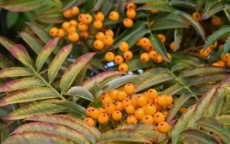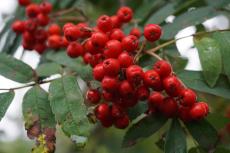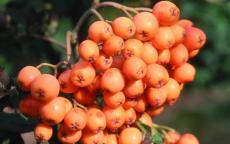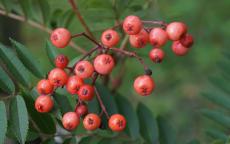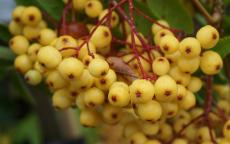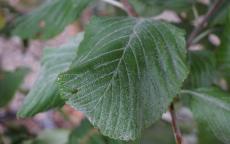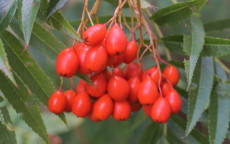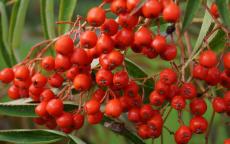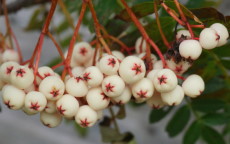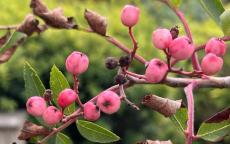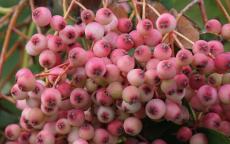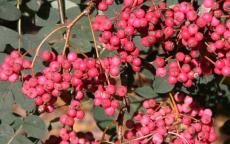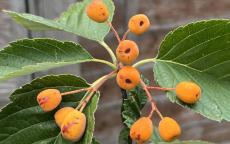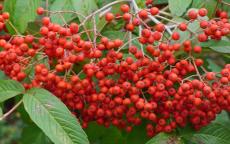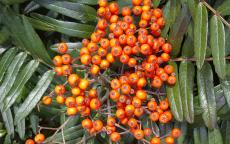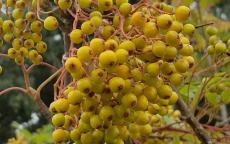Rowan / Whitebeam trees
Rowan or Mountain Ash trees are hardy attractive trees, easy to grow in most situations.
Autumn Spire®
Autumn Spire (Flanrock) is a columnar rowan with yellow fruitlets and excellent autumn colour.£75.00buy- Fruit colour: Yellow
- Awards: RHS AGM (current)
Chinese Lace
A neat attractive Rowan with bright green leaves and dusky pink berries.£66.50buy- Fruit colour: Red
Common Rowan
The Rowan or Mountain Ash, native to most parts of the UK. The leaves turn golden red in autumn, accompanied by clusters of red berries. One of the largest species of Sorbus.£70.00buyBest seller- Fruit colour: Red
Croft Coral
Croft Coral is a small rowan tree but the fruits are an orange coral colour rather than the usual red,£71.50buy- Fruit colour: Orange
Eastern Promise
Features feathered leaves, and pink-red fruitlets.£71.50buy- Fruit colour: Pink
- Awards: RHS AGM (current)
Gibbsii
Gibbsii grows with a neat spreading columnar form, sprinkled with clusters of bright red fruits in the autumn.- Fruit colour: Red
- Awards: RHS AGM (current)
John Bond
An unusual species of Sorbus, the leaves are particularly attractive for their white undersides.- Fruit colour: Brown
- Awards: RHS AGM (current)
Joseph Rock
A small rowan, with distinctive pale yellow fruitlets. Also one of the best for autumn colour.£71.50buyBest seller- Fruit colour: Yellow
- Awards: RHS 1st class
- Awards: RHS AGM (former)
Matthew Ridley
An upright-growing Mountain Ash with dense white flowers and clusters of orange-red autumn berries.£71.50buy- Fruit colour: Yellow / Orange
Olympic Flame
An attractive small rowan tree, its orange/red autumn leaf-colours are amongst the best.£71.50buyBest seller- Fruit colour: Orange / Red
- Awards: RHS AGM (current)
Pearls
A small spreading rowan tree, named for its clusters of pearl-white berries.- Fruit colour: White
Pink Charm
A small rowan with a spreading habit, large feathered leaves, and bright pink berries.£71.50buy- Fruit colour: Pink
Pink Pearl
A small upright rowan tree with clusters of pink-flecked white fruitlets.£71.50buy- Fruit colour: Pink
- Fruit colour: White
Sorbus hupehensis
A classic rowan tree with pink berries and good autumn leaf colours.£71.50buy- Fruit colour: Pink
Sorbus japonica
An upright rowan with large oval leaves and attractive autumn colours and large red fruitlets.- Fruit colour: Red
Sorbus sargentiana
A broad spreading rowan with bright orange fruitlets and autumn foliage.£66.50buy- Fruit colour: Orange / Red
- Awards: RHS AGM (current)
Sorbus scalaris
One of the more spreading smaller Rowan species, with orange/red autumn leaf colours, and clusters of small orange fruilets.£71.50buy- Fruit colour: Orange / Red
Sorbus vilmorinii
The main feature of this Rowan trees is the pink fruitlets, which turn white as autumn progresses. It is one of the smaller Sorbus species, but also one of the more spreading.£71.50buy- Fruit colour: Pink
- Fruit colour: White
- Awards: RHS AGM (current)
Sorbus wardii
A little-known Whitebeam from the Himalayas, featuring large silver-green leaves and yellow-orange berries.- Fruit colour: Yellow / Orange
How to choose Rowan / Whitebeam trees
The Rowans or Mountain Ash trees are a group of mostly small trees growing to about 5m-7m, characterised by their heavily segmented or "pinnate" leaves, which often take on attractive autumn colours. They are also known as Mountain Ash trees, because the leaf has a passing resemblance to the common ash - although they are not related.
They are however distantly related to crab-apples and hawthorns, and most varieties bear clusters of fruitlets which hang on the tree into early winter. The fruits are usually red, but there are also yellow and pink varieties. The berries of many species (especially Sorbus aucuparia) can also be cooked and made into rowan jelly, similar to crab-apple jelly.
All forms of rowan are good sources of food for wildlife from late summer into the early winter.
Rowans are easy to grow, and most are tolerant of a wide range of conditions, including acidic soils, clay soils, wet soils, and exposed situations. Many will tolerate chalk, however they prefer well-drained neutral or acidic soils if possible.
Rowans flower very late - in May or June - and often set fruit by mid-summer. This makes them particularly well-adapted to northern climates with short damp summers and cold winters.
Rowans can be grown successfully in areas with long warm summers, provided you pay attention to watering (particularly with young trees) as they do not tolerate drought.
They can be planted in most locations, but for the best fruit and leaf colours plant in full sun.
They are generally healthy trees, although (reflecting their relation with apples) they can be susceptible to fireblight - fortunately not a common disease in the UK. Scab and aphids can also sometimes be a problem.
The growth habit of most varieties is quite upright, making them good street trees.
Most of our Rowan trees are grafted on to Sorbus aucuparia rootstocks, to help give a consistent size and better tolerance to drought. Some are grafted on Sorbus intermedia which is more suitable for the Whitebeam varieties. Although they are usually just planted and allowed to grow naturally, young Sorbus trees can be cut back and shaped and pruned in a similar way to Malus and Prunus.

